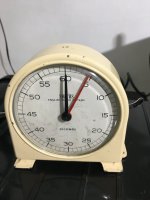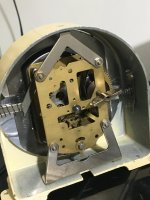Asha
Blithering Idiot
- Messages
- 11,274
- Name
- Asha
- Edit My Images
- Yes
Today I’m in my darkroom ….. First time in ages!
I’ve dug out my old Smiths clock ( I just love these old methods as opposed to modern tech) .
Anyway it’s not so happy with itself in so far as running slow at times , like really struggling to turn for a few seconds then it regains its rythme for a while until it struggled against another stubborn spot.
I’ve tried cycling it a number of times and it was showing some improvement but then following a pause, it’s problem has returned.
I’ve removed the back and I have some very fine ( sewing machine) oil , however I am no expert with clock workings so I’m asking you lot for advice.
Does it need lubricating and if possible to do it myself, what bit do I lubricate ?

I’ve dug out my old Smiths clock ( I just love these old methods as opposed to modern tech) .
Anyway it’s not so happy with itself in so far as running slow at times , like really struggling to turn for a few seconds then it regains its rythme for a while until it struggled against another stubborn spot.
I’ve tried cycling it a number of times and it was showing some improvement but then following a pause, it’s problem has returned.
I’ve removed the back and I have some very fine ( sewing machine) oil , however I am no expert with clock workings so I’m asking you lot for advice.
Does it need lubricating and if possible to do it myself, what bit do I lubricate ?



